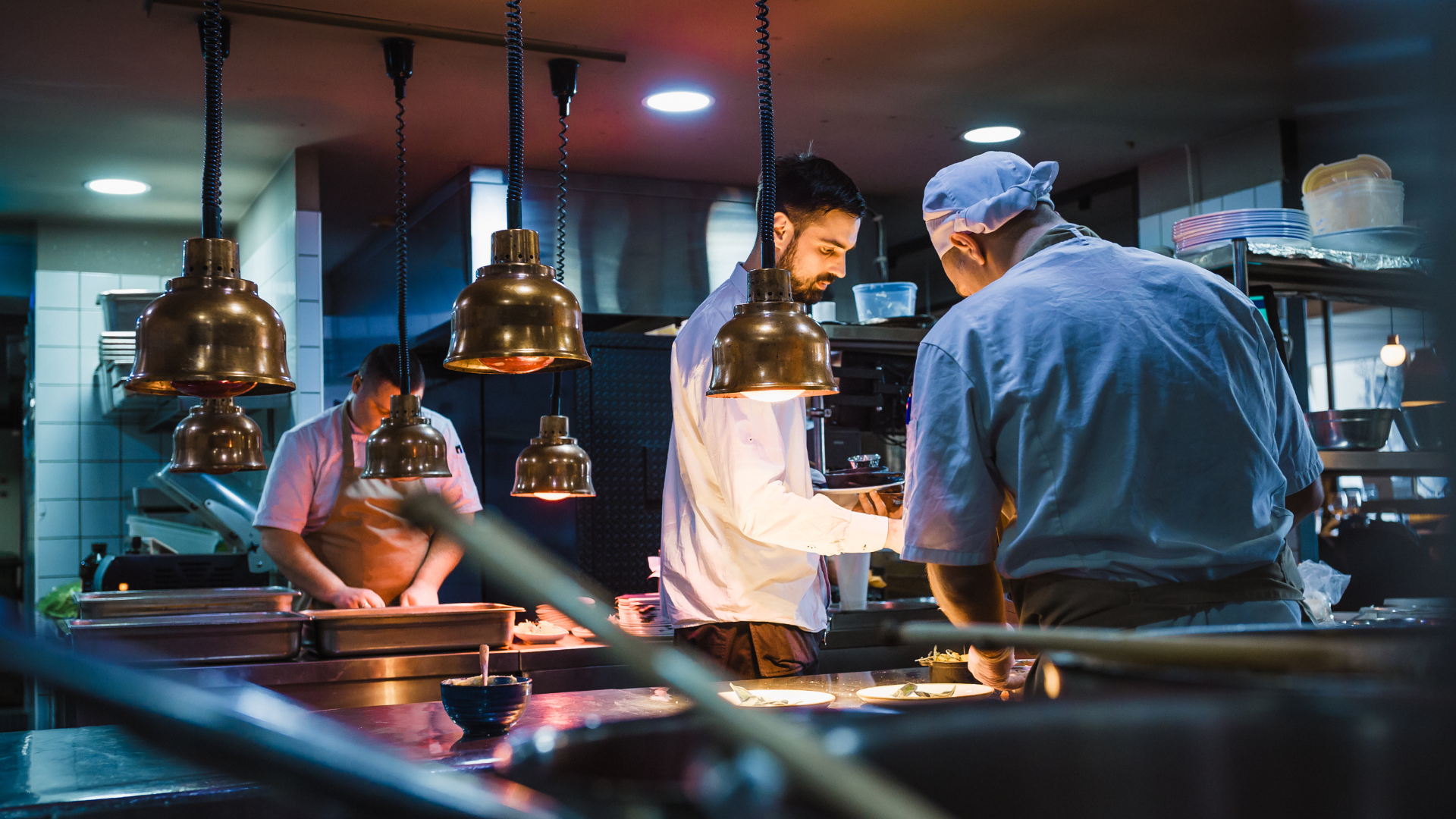According to research, 62% of customers use search engines to discover restaurants. These customers look for the best local restaurants, read reviews, and compare menus before making their decision.
This is why restaurant search engine optimisation (SEO) is essential. Through making your restaurant more visible online, you can attract more reservations to your restaurant.
Whether you’re starting a new venue or improving an existing one, we’ve assembled seven effective tips for boosting your online presence.
What is restaurant SEO?
Restaurant SEO is the task of making your hospitality venue more visible on search engines. When customers Google “restaurants near me”, you want your restaurant to be among the first results they see. This keyword is Googled over 10 million times a month globally.

Restaurant SEO generally focuses on local visibility. When customers search for restaurant-related keywords, Google determines that they are primarily looking for local businesses. This means a new set of SEO tactics come into play compared to other kinds of SEO.
For example, a restaurant’s Google My Business profile is particularly important, as these profiles appear for local searches.
Why is restaurant SEO valuable?
Restaurant SEO helps more people see your restaurant online, making it easier for customers to find and choose you.
According to ResDiary’s Tech Trends report, 93% of diners booked online in the last 12 months, and 81% found it easier than alternative booking methods.
Optimising your online channels, like your website, is the perfect way to capitalise on these customers. With so many restaurant-related searches taking place every single day, SEO is an opportunity you can’t afford to miss out on.
7 ways to maximise your restaurant SEO
Here are seven ways your restaurant can get better results from SEO:
1. Optimise for keywords
Relevant keywords are a foundational component of SEO. Keywords are terms that users search into Google. Optimising for these keywords involves using a range of strategies to make sure your restaurant shows up when these searches are made.
Understanding search intent is key for optimising for keywords. What exactly is a customer looking for when they search for a specific keyword?
Design your website to instantly answer a customer’s search intent. Whether you want to appear for the keyword “Thai restaurant” or “vegan café”, your pages should instantly fulfil the needs of users searching for these terms.
This can involve having relevant content related to the keyword. These search terms also often indicate that the searcher wants to place a reservation with an appropriate restaurant. Having prominent booking widgets on your website is a great way to satisfy search intent and capture reservations.
Avoid over-optimisation or keyword stuffing. Using keywords unnaturally or too frequently can harm your rankings and also make your content less engaging for readers.
Instead, focus on placing keywords naturally in areas that matter most, like:
- Headings (H1, H2) to guide search engines and readers in terms of your content’s structure.
- Meta descriptions that offer a concise summary that encourages clicks from search engine results pages (SERPs).
- Title tags (the link that appears in SERPs) which clearly indicate the purpose of your page, optimised for both users and search engines.
- Dotted naturally throughout the content in a way that fulfils search intent.
2. Build out your website
A well-structured, content-rich website is a powerful asset for improving SEO and satisfying the needs of potential diners.
Each page on your site lets you target specific keywords. They also allow you to provide additional value to your readers.
At a minimum, all restaurant websites should include the following pages:
- Menu pages to showcase your dishes, pricing, and any special offerings. Make it easy for users to browse and include relevant keywords like “farm-to-table dining” or “gluten-free options”.
- An About Us page that tells your story, shares your values, and builds a connection with potential customers. Search engines want to display legitimate, reputable businesses. About Us pages help you prove you fall into this category.
- Contact information that clearly displays your location, phone number, and hours of operation.
Restaurants that want to improve their SEO strategy further should consider some additional pages to target more search queries and boost user engagement. These pages include:
- Staff profiles highlighting your team’s expertise and personalities. This helps to build trust and showcases what sets your service apart.
- Services pages that detail offerings like catering, private dining, or meal delivery to attract additional audiences.
- Customer stories or testimonials sharing positive experiences and reviews to boost credibility.
- Recaps of special events that your business has held in the past to boost user engagement and rank for more specific keywords.
3. Optimise your Google Business Profile
A well-optimised Google Business Profile (GBP) is important for enhancing your restaurant's visibility in search results, especially for local SEO. When diners search for options near them, Google prioritises local businesses with active, well-maintained profiles.
An optimised GBP increases your chances of appearing in local searches and provides essential information at a glance.
To improve your GBP’s performance, focus on the following areas:
- Ensure your address, contact information, and hours are updated and current.
- Upload professional photos that showcase your venue, dishes, and ambience.
- Use posts to share updates, events, and promotions. These keep your profile fresh and engaging.
- Actively encourage customers to leave reviews and respond to them, whether they’re positive or negative. Engaging with your reviews demonstrates a commitment to customer service and helps build trust.
To get the best results from your GBP, use ResDiary’s Reserve with Google integration. This integration lets users make reservations directly from your profile, as well as through Google Search results.
It’s a powerful way to reduce any friction in the reservation process. Diners can see that your restaurant meets their needs and place their booking in moments.
4. Link building
External links are another key component of SEO. Search engines see external links as a form of endorsement from one site to another. If you can accumulate more external links to your website, you can significantly boost your rankings.
One way to attract links is to get your website mentioned in publications. For local SEO purposes, local publications have the most value.
Earning mentions in local publications might involve hosting an event of local interest. You could raise money for a local charity or sponsor a local sporting club.
You can also pitch directly to local publications. If your venue is doing something of interest, like kicking off a zero-waste menu, let local publications know that you’d be happy to offer an interview about it.
Another source of external links is social media. While links from social media don’t carry the same value as media publications, they can have an impact on SEO.
Linking to your venues’ website from your social media profiles can help to build the legitimacy of your business in the eyes of search engines. They can also help search engines discover pages on your website.
A good social media strategy goes hand-in-hand with your SEO strategy. Make life easier for your customers by using ResDiary’s Meta integration.
This integration allows customers to make a booking directly from your social media profiles. It’s an excellent way to craft a seamless booking journey for your customers when they come across your social media posts.
5. Create a smooth booking journey
Search engines prioritise websites that provide great user experiences. They analyse user behaviour on websites, and if they can tell customers aren’t satisfied by your website, your rankings will suffer.
When potential diners visit your website, they’re often there to find key information or make a booking. If the process is complicated or slow, users might immediately leave your site. This is called "bouncing."
A high bounce rate signals to Google that your site is not meeting users’ needs, which can hurt your search rankings.
By making the booking process easier, you can turn more visitors into paying customers. This also helps improve your SEO performance by sending positive signals to search engines.
Need a quick way to upgrade your booking process? Turn to ResDiary’s booking widgets. These widgets allow users to secure their reservation with just a few clicks.
When using the widget, users can easily see available tables. They can choose a time and confirm their booking without leaving the website.
ResDiary’s fully-customisable widgets can be tailored to your branding, ensuring a consistent customer experience. Plus, with ResDiary’s promotions feature, customers can add extras like a drink on arrival using your widgets.
-1.png?width=1920&height=642&name=ResDiary%20Blog%20Images%20-%207%20Restaurant%20SEO%20Tips%20to%20Boost%20Your%20Online%20Presence%20(1)-1.png)
For more information, check out our comprehensive guide to restaurant website design.
6. Offer a great user experience
There are a few more areas you need to focus on when it comes to offering a great user experience. Here are three of the most important ways you can improve user experience and your SEO:
Optimise for mobile devices
With over 60% of web traffic coming from mobile devices, a mobile-optimised website is essential for SEO. Google has adapted to increased mobile traffic, and now evaluates your website’s mobile version first when determining rankings.
Your site should have a responsive design that adapts your website to different screen sizes. This gives users a smooth experience on smartphones and tablets.
Prioritise page speed
Page speed is a key SEO and user experience factor. Slow-loading pages frustrate users, causing them to leave your site before it fully loads.
Three seconds is generally considered the tipping point for a page taking too long to load. You should try to have your pages load even more quickly than that if possible.
Steps like using compressed images and reducing unnecessary coding scripts can help speed up your site. Use tools like Google PageSpeed Insights to identify and resolve performance bottlenecks.
Ensure intuitive navigation
Clear and logical navigation keeps users engaged and prevents them from feeling lost or frustrated on your site.
A well-structured menu, easily accessible contact information, and prominent calls to action (such as booking widgets) help visitors find what they’re looking for more easily.
Visitors who struggle to navigate your site are more likely to leave, increasing your bounce rate and hurting your SEO performance. You can improve your navigation by organising your navigation bar with clear labels, using dropdowns for subcategories, and including a search function for larger sites.
7. Encourage reviews and feedback
Beyond their impact on customer trust, reviews send strong signals to search engines about a business's quality and popularity. Encouraging and leveraging customer reviews can provide direct benefits for SEO.
Google prioritises businesses with many high-quality reviews on their Google Business Profile. Positive reviews help your GBP stand out and influence your local search rankings.
Actively ask satisfied customers to leave reviews on your GBP, and respond to every review you receive. You can easily achieve this using ResDiary’s email templates, which includes requests for post-dining feedback.
Customer reviews can also be repurposed as website content. They can be transformed into testimonials, case studies, or quotes featured on key pages. This is another excellent way to build trust and credibility for your site.
Build an online presence with ResDiary
You need the right tools to boost your restaurant's online presence. In the hyper-competitive hospitality industry, ResDiary has the tools you need to stand out.
With ResDiary’s booking widgets, customers can easily place reservations. ResDiary automatically manages your diary so you only accept the bookings you want.
Plus, ResDiary’s integrations with Meta and Reserve with Google help you capitalise on your online presence even more effectively with seamless booking journeys.
Book a demo with ResDiary today to learn more about how we can help attract more customers to your venue.



.png?width=520&height=293&name=Download%20Attract%20Guide%20(1).png)



